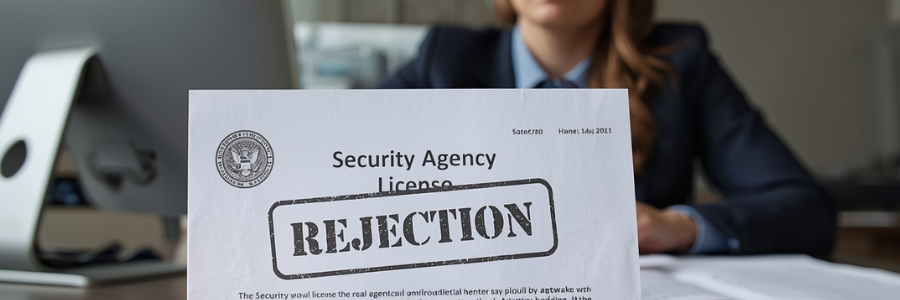Difference Between PSARA License & Private Security Agency License: Explained
Securing a legitimate license is the prerequisite for the private security industry. The license certifies the lawful organization of the business, as well as licensure and compliance. It ensures that organizations hire competent personnel, adhere to established standards of behavior and training, and follow the law. Follow established standards of conduct and training, hire qualified staff, and operate within the law. However, without the certificate, the industry may face legal obligations, including a compromise with public trust and safety. When the topic is about authorization, the major terms are “PSARA License” and “Private Security Agency License.” Let’s take a look at the guide to know how the PSARA registration certificate differs from a private security agency license.
PSARA License Registration: An Outline
The PSARA license, which complies with the requirements of drafted Private Security Agencies (Regulation) Act, 2005, is the mandatory license needed for any private security agency to operate lawfully in India. The PSARA License is intended to carefully regulate and monitor the private security agency industry to ensure their functioning falls within the legal framework, for public safety, and for their standards of business. The Act sets the training and other requirements for security guards, such as uniforms, physical fitness, and training security guards, which is not the responsibility of private security agencies or which, through the operations of the internal agency, does not encroach into the public police system through the labor law duty of the private security agencies.
2. The Key Objectives: Regulates and Monitors Security Agencies
The key aspects include
- Build professionalism: The Act is intended to standardize the private security sector, increasing professionalism and accountability.
- Provide compliance: It gives a legal basis for the operation of private security agencies, ensuring they will operate within the confines of recognized national security standards.
- Protect public interest: The Act will help to protect the interests of clients and employees by regulating private security agencies.
- Prevent interference: One of the primary objectives will be to ensure private agencies do not interfere with the official law and order scheme.
- Set Standards: The PSARA license sets robust guidelines for guards, training, specific uniforms, and the requirement for physical fitness.
- Ensures Adherence to Labor Laws: It verifies that the agency regularly aligns with the rules set by the labor law department.
3. What Is a Private Security Agency License?
The complete description of the PSARA license is the private security agency license. It is further recognized as the government-authorized requirement for a company. This license enables the private security agencies to lawfully function in India. Furthermore, the Private Security Agencies (Regulation) Act, 2005, governs the license. To obtain it, the applicant is first required to meet the state government laws. The registration is vital to ensure that the agency has met mandatory background checks, financial scrutiny, and training standards.
4. Distinguish Between the PSARA & the Private Security Agency License
Well, there is no difference between the PSARA certificate and a private security agency license. These two terms exact the same mandatory legal authorization for the private security agency. For the permission of a private security agency license, the businesses apply for a PSARA license with the state’s controlling authority. In short, the PSARA license is a formal term that is governed. The license is generally referred to as the PSARA license simply because it is granted under the “Private Security Agency Regulation “Act, 2005.” In detail:
- Name: The common acronym is PSARA License. “Private Security Agency License” is the complete description.
- Governing Law: Under the Private Security Agencies (Regulation) Act, 2005, obtaining the PSARA legal requirement in India.
- Purpose: It provides the legal framework for the private security departments such that they can operate within set regulations. In short, the PSARA registration certificate provides the ability to standardize the operations of the agency for the agency guards to be properly trained and function professionally.
- Requirement: Every person or organization wishing to operate a private security agency in India must be compliant with the laws.
- Issuing Authority: Under the auspices of the Ministry of Home Affairs, the appropriate state authority grants the license.
5. Government & State Websites Use Both Terms Interchangeably
When looking at the differences between their own and respective government websites, we can agree on both the terms with the words “license from PSARA” and “license to a private security agency.” The license is issued ultimately through the legislation entitled the Private Security Agencies (Regulation) Act 2005, or PSARA. The Central Government’s official licensing government website is entitled the “Private Security Agency Licensing Portal India—PSARA.” This website and other official documents refer to the PSARA license or the Private Security Agencies license or both acronyms. This is additional assistance confirming equivalency.
6. Conclusion | Private Security Agency License vs PSARA License
PSARA license or Private Security Agency License refers to the same term. The PSARA registration is mandatory for those who regulate the private security agencies in India under the Private Security Agencies Act, 2005. In essence, the PSARA license is an official name, whereas the private security agency license is a descriptive term. Do not confuse the multiple terms; consider a consultant to help streamline the registration process. Visit the LegalRaasta.com website for more updates.
User Query: Timeline and Fees Structure for PSARA License Registration
7. Frequently Asked Questions
(a) How do security agents differ from security agencies?
Ans. An individual who serves as a security agent is employed by the security agency to provide security services in India.
(b) Under which act is the PSARA license issued?
Ans. The PSARA certificate is issued under the Private Security Agencies (Regulation) Act, 2005.
(c) Who issues the private security license?
Ans. The controlling authority, which is appointed by the state government, grants approval for the PSARA registration certificate.
(d) What is Section 7 of the PSARA Act?
Ans. The section demonstrates the process of a private security agency for the PSARA licensing. It highlights that the applicant must complete all required training and complete the registration process with the prescribed application fees.
(e) Is DSC mandatory during security company registration?
Ans. During the registration process, you may be required to have a Digital Signature Certificate (DSC).










